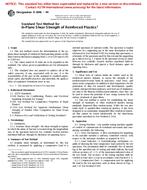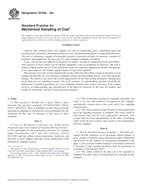1.1 This guide describes tests that may be applied to new or previously used thermocouples for the purpose of verification. Some of the tests perform a suitable verification by themselves, but many tests merely alert the user to serious problems if the thermocouple fails the test. Some of the tests examine inhomogeneity and others detect wire or measuring-junction breakage. For Style U mineral-insulated metal-sheathed (MIMS) thermocouples with ungrounded measuring junctions, this guide includes tests that examine the electrical isolation of the sheath as well as sheath deterioration.
1.2 The first set of tests involves measurement verifications designed to be performed while the thermocouple is in its usage environment. The second set is composed of electrical tests and visual inspections designed to evaluate the functionality of the thermocouple; these tests may be performed either in house or in a calibration laboratory. The third set is made up of homogeneity tests designed to be performed in a calibration laboratory. Some of the tests provide simple methods to identify some, but not all, defective thermocouples, and alone do not suffice to verify a used thermocouple. They may need to be complemented by other tests for a complete verification.
1.3 The reader of this guide should decide which of the described tests need to be performed. This decision is dependent on whether the reader uses thermocouples for temperature measurement or performs thermocouple calibrations in a laboratory. For users of thermocouples, it is recommended that appropriate tests from the first and second sets be performed initially, as they provide immediate on-site verification of the thermocouples. The appropriateness of a test is dependent upon the user's temperature measurement uncertainty requirements. Some tests may have lower uncertainties in their verification measurements than others. If these tests do not clearly determine the suitability of the thermocouples, they should be sent to a calibration laboratory for performing appropriate tests from the third set, which give the most complete information on the thermocouple homogeneity. For those who perform thermocouple calibrations in a laboratory, it is recommended that appropriate tests from the second and third sets be performed prior to calibration. The appropriateness of a test is dependent on the calibration laboratory's capability and convenience for performing the test, as well as the characteristics of the unit under test (UUT).
1.4 This guide may be used for base metal and noble metal thermocouples. Some of the methods covered may apply to refractory metal thermocouples but caution is advised as suitable reference devices at high temperatures may not be readily available.
1.5 This guide may involve hazardous materials, operations and equipment. This standard does not purport to address all of the safety concerns, if any, associated with its use. It is the responsibility of the user of this standard to establish appropriate safety and health practices and determine the applicability of regulatory limitations prior to use.
Product Details
- Published:
- 11/01/2011
- Number of Pages:
- 20
- File Size:
- 1 file , 560 KB


